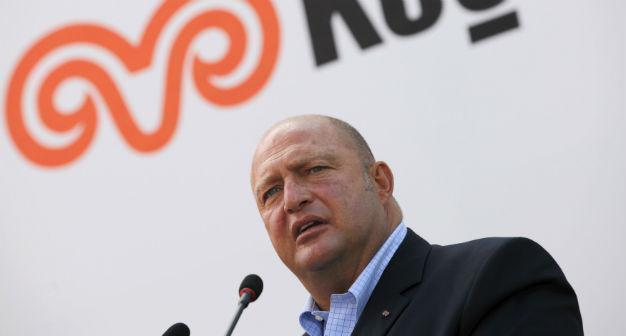Leading Turkish businessman Mustafa Koç dies of heart attack aged 55
ISTANBUL

REUTERS photo
Mustafa Koç, the chairman of Turkey's largest conglomerate, died of a heart attack on Jan. 21, the Vehbi Koç Foundation American Hospital in Istanbul has announced.
He had been brought to Istanbul’s Beykoz State Hospital on the morning of Jan. 21.
Koç was later transferred to the Vehbi Koç Foundation American Hospital (Amerikan Hastanesi), which his family owns, by helicopter.
The Beykoz State Hospital had said Koç suffered a heart attack while exercising. First aid was provided by his bodyguard and exercise coach and he had been resuscitated at the hospital, it added.
Mustafa Koç recently underwent weight loss surgery, and also had a history of heart problems. He underwent heart surgery in 2002, when three veins leading to his heart were opened with stents. The condition was noticed during a medical examination in the United States.
Koç Holding expressed “deep sorrow” on its Twitter account, sending its condolences while also noting that its chairman lost his life despite all medical efforts.
President Recep Tayyip Erdoğan has also reportedly called Rahmi Koç and Ali Koç to offer his condolences to the family.
Prime Minister Ahmet Davutoğlu also offered his condolences to the Koç family, saying the death was a “huge loss.”
President Erdoğan had hosted Mustafa Koç and Ali Koç at the presidential palace in Ankara on Jan. 20, according to presidential sources.
Koç was planning on the afternoon of Jan. 21 to fly to Zurich and Davos, where he was due to speak at the HeForShe event calling for gender equality.
Koç Holding said in a statement that funeral prayers for Koç would be performed at Marmara University's Tatbikat Mosque on Jan. 24 and that he would be laid to rest in the family grave at Zincirlikuyu Cemetery.
It also added that condolences would be accepted at Divan Hotel in Istanbul’s Taksim neighborhood for a week between 4 p.m. and 7 p.m.
Born in 1960, Koç was educated at the Lyceum Alpinum Zuoz in Switzerland and graduated from George Washington University in 1984. As a third-generation member of the Koç family, he was appointed president of Koç Holding in 2003, replacing his retired father, Rahmi Koç. Koç was the head of the High Advisory Council of Turkey’s top business organization, TÜSİAD, between 2005 and 2010. He was also the honorary president of the High Advisory Board of TÜSİAD and a member of the Foreign Economic Relations Board (DEİK).
During his term, a number of Koç businesses posted very high growth levels and became much more global.
Koç Holding has been the only Turkish business group on the Fortune 500 Global List. According to latest data from the Istanbul Chamber of Industry, there are five Koç companies in Turkey’s largest industry companies. Koç Holding owns Turkey’s oil refinery, Tüpraş, two major automotive producers in metal, Tofaş and Ford Otosan, home appliance maker Arçelik and LPG for cars and bottled gas retailer Aygaz on the İSO’s latest annual list. The group also owns Yapı Kredi Bank, fuel distribution company Opet and defense maker Otokar, among others.
Turkish energy giant Tüpraş was also named the country’s export champion in 2014, while its partnered foreign carmakers dominated the top 10 list of leading exporters, according to a survey by the Turkish Exporters’ Assembly (TİM).
On the top ten list, car maker Ford, a joint venture of Ford and Koç Holding, followed Tüpraş. Arçelik was in the sixth spot, followed by Italian automotive giant Fiat’s local partner with Koç Holding, Tofaş.
Koç Holding made around 45 percent of Turkey’s car production and 43 percent of the country’s total car exports. Its share in the country’s total exports is around 10 percent. Koç Holding companies account for 18 percent of the total market capitalization of the Istanbul stock exchange.
Koç has had, at times, an uneasy relationship with the Justice and Development Party (AKP), founded by President Recep Tayyip Erdoğan. Recently, there had been signs of reconciliation, however, and the two met in Ankara on Jan. 20, hours before Koç died.
A major public tension between Koç and the AKP government emerged in 2013 during the Gezi Park protests. In one incident during the month-long anti-government demonstrations, protesters attempted to escape police tear gas and pepper spray by taking refuge in an Istanbul hotel, the Divan, owned by Koç. Hotel management admitted the protesters into its lobby, which quickly turned into a makeshift first aid room. A few days later, an angry Erdoğan said in a public rally, “We know which hotel owners helped the terrorists [protesters]. It is a crime to abet terrorists. And those crimes will not remain unpunished.”
Shortly after Erdoğan’s speech, tax police raided Koç’s refinery subsidiary, Tüpraş. Officials said it was a regular inspection. But in September 2013, the government’s executive committee that oversees defense procurement scrapped a $2 billion deal with Koç’s shipyards, RMK Marine, starting a new competition.
The Koç family chose to remain silent at the time. After a year after these developments, Mustafa Koç gave the following response in an exclusive interview with daily Hürriyet in March 2014: “We opted not to respond even though we were attacked a lot during and after Gezi. Fighting with our state does not suit us. Well, of course, we have brought our reputation to its current level in 90 years and we will not allow anybody to trample it. For this reason, we will defend our legal rights until the end against all false stories.”
